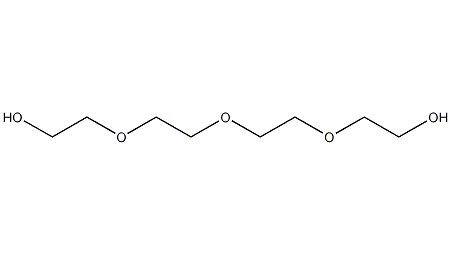Tetraethylene glycol Tetraethylene glycol


Structural formula
| Business number | 0367 |
|---|---|
| Molecular formula | C8H18O5 |
| Molecular weight | 194.23 |
| label |
Tetraethylene glycol, Polyethylene glycol-4, Tetraethylene glycol, OHC2H4OC2H4OC2H4OC2H4OH, Bis[2-(2-hydroxyethoxy)ethyl] ether, 2,2’-[Oxybis(2,1-ethanediyloxy)]bis-ethano, 2,2′-(Oxybis(ethyleneoxy))diethanol, admixture, Multifunctional solvents, heat carrier |
Numbering system
CAS number:112-60-7
MDL number:MFCD00002879
EINECS number:203-989-9
RTECS number:XC2100000
BRN number:1634320
PubChem number:24888420
Physical property data
1. Properties: Colorless to light straw-colored viscous liquid, easily hygroscopic.
2. Density (g/mL, 20/20℃): 1.1248
3. Relative vapor density (g/mL, air=1): 6.7
4. Melting point (ºC): -6.2
5. Boiling point (ºC, normal pressure): 327.3
6. Refractive index (20ºC): 1.4598
7. Viscosity (mPa·s, 20ºC): 55
8. Flash point (ºC, opening): 173.9
9. Heat of vaporization (KJ/mol): 72.4
10. Autoignition point or ignition temperature (ºC): 340
11. Vapor pressure (mmHg, ºC): <0.01
12. Vapor pressure (kPa, 153.9ºC): 0.133
13. Vapor pressure (kPa, 20ºC): <0.000133
14. Solubility: miscible with water and alcohol. Insoluble in benzene, toluene and aliphatic hydrocarbons.
Toxicological data
1. Irritation: Rabbit transdermal: open irritation test, 550mg, mild irritation. Rabbit eye: 500mg, mild irritation.
2. Acute data: rat oral LD50: 34650 mg/kg; rabbit transdermal LD50: 22500 mg/kg
Ecological data
This substance may be harmful to the environment, and special attention should be paid to the pollution of water bodies.
Molecular structure data
1. Molar refractive index: 47.41
2. Molar volume (cm3/mol): 174.6
3. Isotonic specific volume (90.2K ): 442.8
4. Surface tension (dyne/cm): 41.3
5. Polarizability (10-24cm3): 18.79
Compute chemical data
1. Reference value for hydrophobic parameter calculation (XlogP): -1.6
2.�Number of �� bond donors: 2
3. Number of hydrogen bond acceptors: 5
4. Number of rotatable chemical bonds: 10
5. Interconversion Number of isomers: None
6. Topological molecule polar surface area 68.2
7. Number of heavy atoms: 13
8. Surface charge: 0
p>
9. Complexity: 78.6
10. Number of isotope atoms: 0
11. Determine the number of atomic stereocenters: 0
12 .The number of uncertain atomic stereocenters: 0
13. The number of determined chemical bond stereocenters: 0
14. The uncertain number of chemical bond stereocenters: 0
15. Number of covalent bond units: 1
Properties and stability
Avoid contact with strong oxidants and strong alkali.
Storage method
Store in a cool, ventilated warehouse. Keep away from fire and heat sources. Protect from direct sunlight. Keep container tightly sealed. They should be stored separately from oxidants and alkalis, and avoid mixed storage. Equipped with the appropriate variety and quantity of fire equipment. The storage area should be equipped with emergency release equipment and suitable containment materials.
Synthesis method
It is obtained industrially as a by-product during the production of ethylene glycol.
Purpose
1. Used in organic synthesis as solvent, heat carrier and gas chromatography stationary solution. Use in conjunction with dehumidifying solvents, moisturizers, softeners, nitro spray paints, plasticizers, etc.
2. Use in conjunction with dehumidifying solvents, moisturizers, softeners, nitro spray paint, plasticizers, etc. Due to its high boiling point, it can also be used as a heat transfer medium.
